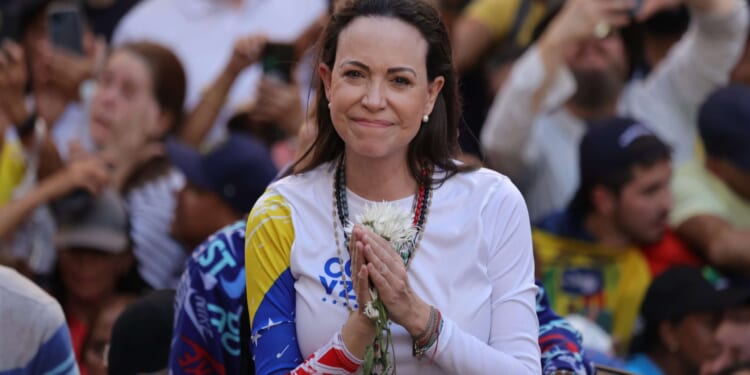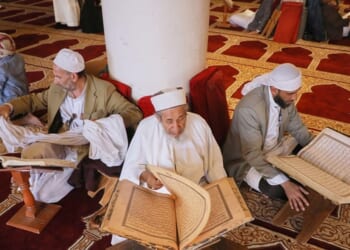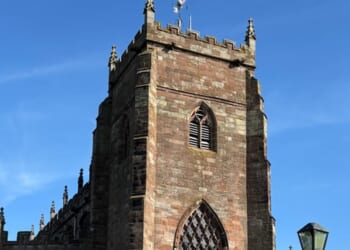The Norwegian Nobel Institute has awarded Venezuelan opposition leader María Corina Machado the Nobel Peace Prize “for her tireless work promoting democratic rights for the people of Venezuela and for her struggle to achieve a just and peaceful transition from dictatorship to democracy.”
“I have no words. Thank you so much, but I hope you understand this is a movement. This is an achievement of a whole society. I am just one person,” Machado told Kristian Berg Harpviken, director of the Norwegian Nobel Institute, during the call announcing her win on Friday.
For the past 14 months, Machado has been living in hiding, likely somewhere in Venezuela, after leading the pro-democracy movement that became the driving force behind the country’s 2024 presidential election. Her retreat into hiding reflects the regime’s intensifying crackdown on dissent, which has left more than 800 opposition activists imprisoned, including several of her closest collaborators.
Among Venezuelan opposition leaders, Machado stands out for her belief in classical liberalism and free market capitalism. Her platform calls for the privatization of the country’s state-owned oil industry, arguing that Venezuela can once again become a capitalist success story if the government radically reduces its role in managing the economy. She is also one of the few prominent figures to openly embrace socially liberal causes, such as same-sex marriage and the use of medical marijuana. The Maduro regime has characterized her movement as “anarcho-capitalist.”
Although opposition to Venezuela’s authoritarian regime spans the political spectrum—from the Venezuelan Communist Party to Machado’s own Vente Venezuela, a liberal party—her determination and leadership have made her the central figure in the country’s pro-democracy movement, earning her the nickname “the Iron Lady.” Machado has long criticized the regime not only for its lack of democracy but also for its attacks on individual liberty.
Machado became a sensation on the streets of Venezuela as she campaigned ahead of the 2024 presidential election, traveling across the country and drawing thousands of supporters wherever she went. Standing on makeshift stages with modest sound systems, she focused her message on dismantling the myths of the socialist revolution. When she declared, “Being rich is good,” the crowd erupted in applause.
The line was a direct rebuttal to former President Hugo Chávez, who once said in a televised speech that “being rich is bad, it’s inhuman.” Chávez assumed power in 1999, founding the socialist movement that dominates Venezuela to this day. That ideology has fueled the country’s political repression and economic collapse, driving an exodus of more than 8 million people—the largest refugee crisis in modern times not caused by war.
Machado’s political career began in 2002, when she cofounded Súmate, a civil organization advocating for electoral transparency amid Chávez’s efforts to consolidate control over the voting system. In 2010, she was elected to the National Assembly, winning more votes than any other candidate in Venezuela’s legislative history. In one of her most famous moments, Machado confronted Chávez on the Assembly floor, telling him that by expropriating private property, his government was engaging in theft.
In 2014, after she spoke at a meeting of the Organization of American States, the Venezuelan regime stripped her of her parliamentary seat in an attempt to silence her. But Machado continued organizing opposition forces and laying the groundwork for a democratic transition.
Her most significant breakthrough came in 2023, when she mobilized Venezuelans to participate in opposition primaries organized entirely by civil society, without state resources. Despite being officially disqualified from holding office, she won 92 percent of the vote, becoming the opposition’s presidential candidate. When the regime barred her from registering, she named Corina Yoris Villasana, a university professor with no prior political experience, as her substitute. When the regime blocked Yoris as well, Machado’s coalition turned to Edmundo González Urrutia, a little-known former diplomat.
The regime appeared to believe that running an obscure figure would weaken Machado’s movement. Instead, the strategy backfired. On July 28, 2024, Venezuelans turned out en masse to vote for González, who won 67 percent of the vote, defeating Nicolás Maduro, who received about 30 percent.
Maduro, who took power after Chávez’s death in 2013, faces charges of narco-terrorism, drug trafficking, and corruption. He is a fugitive wanted by the U.S. District Court for the Southern District of New York. The U.S. Department of Justice and Department of State have jointly offered a $50 million reward for information leading to his capture—the largest bounty in U.S. history, doubling the one once offered for Osama bin Laden. Maduro is also under investigation by the International Criminal Court for alleged crimes against humanity.
Official election results released by Venezuela’s electoral authority, however, diverged sharply from independent tallies. To substantiate their claims of victory, opposition activists published 85 percent of the vote tallies from polling stations online, making them publicly accessible. Maduro has produced no evidence that he won.
Machado’s Nobel Prize marks a rare international acknowledgment of classical liberalism in a region long dominated by populism and state control. Her victory highlights the persistence of an idea once thought extinguished in Venezuela: that freedom and individual rights can outlast even the most entrenched regimes.

















